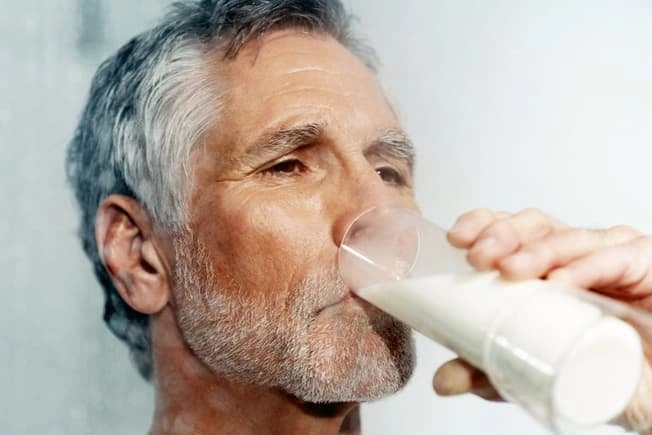Things Your Body Needs as You Age
calcium
1/14
As we age, we can begin to lose more of this mineral than we absorb. This causes bones to break easily (osteoporosis), especially in postmenopausal women.Calcium helps muscles, nerves, cells, and blood vessels to function properly. Most often, it is obtained from bones, which are obtained from food. A woman over the age of 50 and her man over the age of 70 should consume about 20% more than other adults. Milk, yogurt and cheese are good sources.
Vitamin B12
2/14
Helps the formation of blood and nerve cells. It can be obtained naturally from animal products such as meat, fish, eggs and dairy products. ''Vitamin B12 fortified'' foods such as tablets, shots, and breakfast cereals are other sources. Most Americans eat enough, but age can change that. Up to 30% of people over the age of 50 have atrophic gastritis, which makes absorption from food difficult. Antacids, some medications, and weight loss surgery can contribute to B12 deficiency.
Vitamin D
3/14
Your body needs it to absorb calcium. Take together to prevent osteoporosis. Vitamin D also helps your muscles, nerves, and immune system function properly. Most people get their vitamin D from sunlight. However, as we age, our bodies become less able to convert sunlight into vitamin D. It's difficult to get this vitamin from food, but oily fish such as salmon, mackerel, and sardines are good sources.
Vitamin B6
14.4
Your body uses it to fight bacteria and get energy. It also helps your baby's brain grow. As you get older, you will need more B6. Some studies have found an association between higher blood levels of B6 in older people and improved memory. Chickpeas are an easy and inexpensive source. So are liver, fatty fish, and fortified breakfast
cereals.
magnesium
5/14
Helps the body build protein and bone and stabilizes blood sugar levels. You can get it from nuts, seeds, and leafy greens. However, older people tend to eat less. They are also more likely to have long-term health problems or take many medications, both of which can lead to magnesium deficiency.
probiotics
14.6
These ''friendly'' bacteria are good for your gut. You can get it from fermented foods such as yogurt and sauerkraut, as well as dietary supplements. They can help with digestive problems like diarrhea and irritable bowel syndrome, and even protect against allergies.If you're healthy, probiotics are probably safe. If you have a drop, talk to your doctor first.
omega 3 fatty acids
7/14
These fatty acids are called ''essential'' because the body cannot make them. They are important for eyes, brain and sperm cells. It also helps protect against age-related diseases such as Alzheimer's disease, arthritis, and macular degeneration that can lead to blindness.Unless otherwise directed by your doctor, oily fish, walnuts, and canola. It's best to get your omega-3s from foods such as oils and flaxseeds.
zinc
8/14
Many older Americans don't get enough of this underrated micronutrient, which helps our senses of smell and taste, and fights infections and inflammation. All of these play an important role for older people. Zinc can also protect eyesight. Oysters are the best source of this mineral. Otherwise, you can get it from beef, crab, and fortified breakfast cereals.
selenium
14.9
It protects cells from damage and infection and maintains normal functioning of the thyroid gland. Selenium can also keep muscles strong and prevent age-related diseases such as dementia, some cancers, and thyroid disease. One to two Brazil nuts per day is sufficient. don't exaggerate. Too much selenium can lead to hair loss and brittle nails.
14.10
Potassium is involved in almost everything in your body, including your heart, kidneys, muscles, and nerves. It also helps prevent stroke, high blood pressure, and osteoporosis. Many Americans can't get enough. Dried apricots, bananas, spinach, milk and yogurt are good sources.Consult your doctor before taking dietary supplements. They can interfere with medications for high blood pressure, migraines, and other conditions.
folic acid
14.11
This natural form of vitamin B9 is found in leafy green vegetables, nuts, beans and other foods. Pregnant women take a laboratory-made form of vitamin B9 called folic acid to prevent birth defects. Folic acid helps cells grow and may prevent stroke and certain types of cancer. Most Americans have had enough. Folic acid in food is harmless. However, too much folic acid from supplements or fortified foods can increase your chances of developing colon cancer and nerve damage.
fiber
12/14
You probably know that fiber is good for you. But did you know that the older you get, the more important it becomes? Fiber helps prevent stroke, increases bowel movements, and lowers cholesterol and blood sugar levels. Women over the age of 50 should be getting at least 21 grams per day, and men 30 grams, but most people don't get as much. This equates to about 6-8 servings of whole grains or about 8-10 servings of vegetables.
where can i get it
13/14
Whether it's vitamins, minerals, or fiber, it's best to get them from food rather than tablets. You are most likely deficient in vitamin D, potassium, calcium, or fiber. If you think you need more than what you get from food, talk to your doctor about medications, diet, and supplements that are safe for your health.
multivitamin
14/14
There is little, if any, evidence that multivitamins benefit otherwise healthy older adults.The American Preventive Services Task Force advises avoiding daily multivitamins to prevent cancer and heart disease. doing. Multivitamins marketed for seniors can be adjusted with high doses of vitamin D or B12 or less iron. But unless you suffer from anorexia or a condition that prevents you from eating healthy, you probably don't need them.
21 Dec 2022







